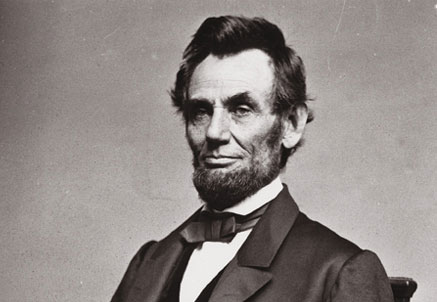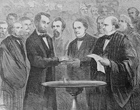Defining America
On June 16, 1864, President Abraham Lincoln made one of his rare wartime departures from Washington. He spoke in Philadelphia at a fund-raising fair for the United States Sanitary Commission, a national soldiers' aid society. The preceding six weeks had seen the bloodiest fighting in the Civil War so far, at the carnage-strewn Virginia battlefields of The Wilderness, Spotsylvania, Cold Harbor, and Petersburg. "War, at the best, is terrible," Lincoln told the crowd, "and this war of ours, in its magnitude and duration, is one of the most terrible. . . . It has destroyed property, and ruined homes. . . . It has carried mourning to almost every home, until it can almost be said that 'the heavens are hung in black.'" When would this cruel war be over? many were asking. "We accepted this war for an object," said the president, "a worthy object of restoring the national authority over the whole national domain." The war would end only "when that object is attained." During the battle of Spotsylvania, Union General Ulysses S. Grant had said that he intended to fight it out on that line if it took all summer. Lincoln added: "I say we are going through on this line if it takes three years more." This grim determination to fight on to victory despite the cost characterized Lincoln's leadership in the war. Confederate President Jefferson Davis was no less determined. "We are fighting for INDEPENDENCE and that, or extermination, we will have," he told a Northern journalist in July 1864. "You may 'emancipate' every negro in the Confederacy, but we will be free. We will govern ourselves . . . if we have to see every Southern plantation sacked, and every Southern city in flames."
Many people in both North and South sometimes faltered in the face of the war's terrible cost in lives and resources. Others opposed the war altogether. But enough supported the contrasting goals of Lincoln and Davis that the war continued four long years, ending only when Southern resources and Confederate armies had been so eviscerated that they were no longer capable of fighting. The toll of more than a million casualties, 620,000 of them dead, was far greater than in any other war this country has fought. The 620,000 dead were 2 percent of the total American population (North and South) in 1861. By way of comparison, if 2 percent of the American people were to die in a war fought today, the number of American deaths would be more than six million.




